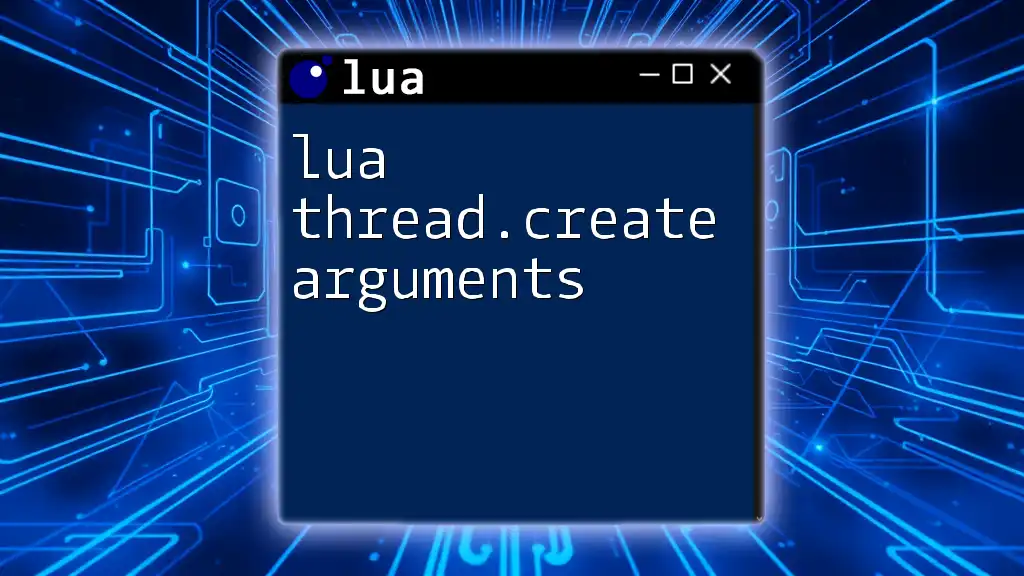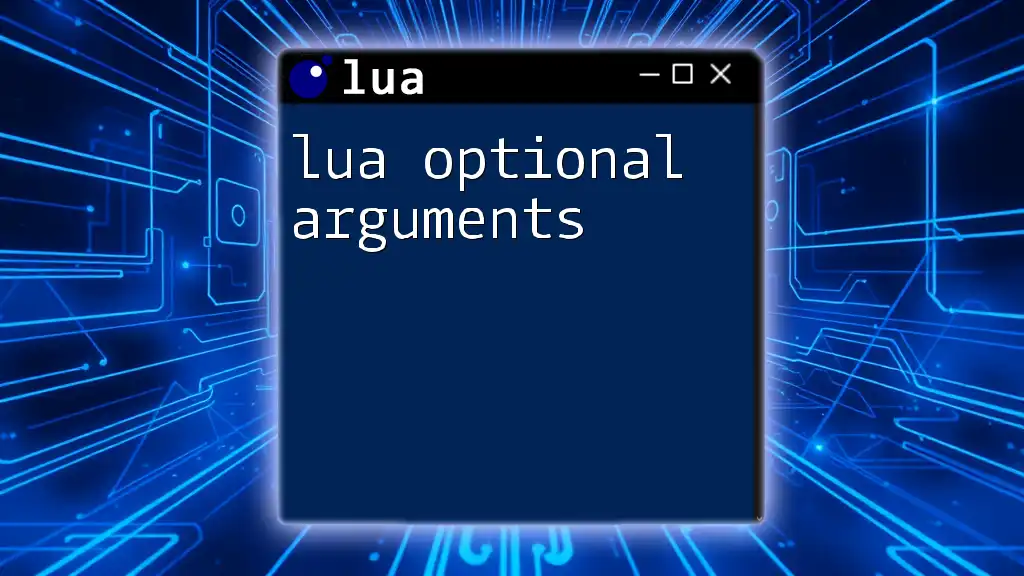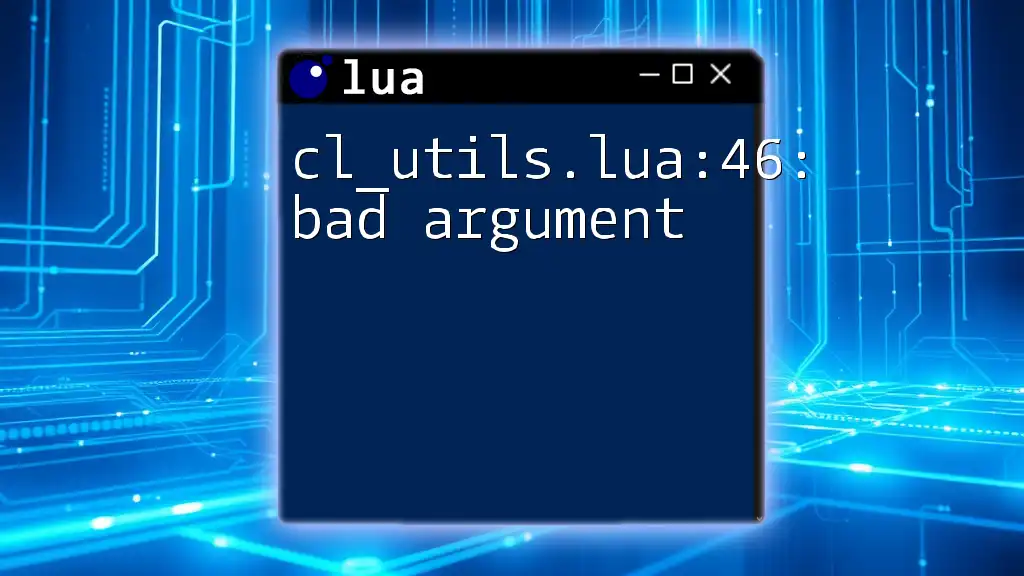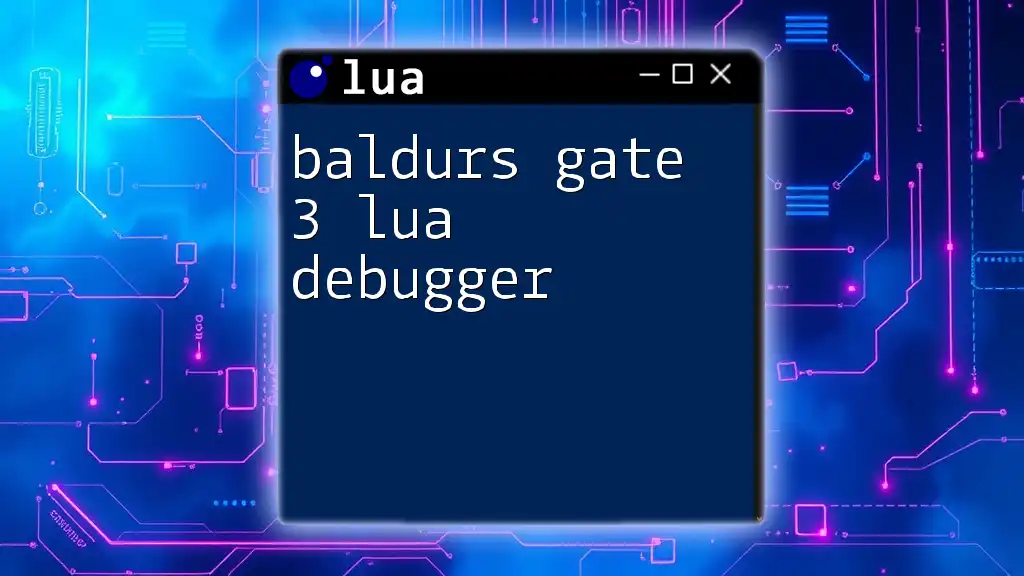The error "cl_utils.lua:46: bad argument" typically indicates that a Lua function received an argument that was not of the expected type or format, leading to a failure in execution.
Here's a code snippet demonstrating a bad argument error in Lua:
function setVolume(volume)
if type(volume) ~= "number" then
error("bad argument, expected a number")
end
-- Set the volume level
end
setVolume("loud") -- This will cause the error
Understanding the Error
What is `cl_utils.lua`?
`cl_utils.lua` is a Lua utility file commonly used in various scripts and applications. It often serves as a library that incorporates functions designed to ease the development process by providing reusable code snippets for various tasks. For instance, you might find functions for managing arrays, manipulating strings, or handling mathematical computations.
What Does `bad argument` Mean?
In Lua, the error message `bad argument` signals that the arguments passed to a function do not meet the expected criteria. This can include issues such as data type mismatches, incorrect numbers of arguments, or failing to meet specific conditions that the function requires to operate correctly. Understanding what constitutes a 'bad argument' is crucial for debugging and ensuring your scripts run smoothly.

Causes of `bad argument` Error
Incorrect Data Type
One of the most frequent reasons for a `bad argument` error is when the function receives an argument of the wrong data type. For example, consider a function that is designed to calculate the square of a number but mistakenly receives a string instead:
function square(num)
return num * num
end
print(square("hello")) -- Here, the argument is a string, leading to a bad argument error.
Out-of-Bounds Values
Another common issue arises when the values passed to a function fall outside an acceptable range. Some Lua functions, particularly those dealing with arrays or tables, require that indices remain within certain limits. For example:
local myArray = {1, 2, 3}
print(myArray[5]) -- Attempting to access an index that does not exist results in a bad argument error.
Missing Required Arguments
Certain functions in Lua require a specific number of arguments to execute properly. If a function call is made with fewer arguments than required, it will throw a `bad argument` error. For example:
function greet(name, greeting)
print(greeting .. ", " .. name)
end
greet("World") -- Missing the second argument leads to a bad argument error.
Condition Failures
Sometimes, the function expects conditions to be met before executing. If these conditions are not satisfied, particularly with parameters that should not be `nil`, a `bad argument` error can occur:
function setAge(age)
if age == nil or age < 0 then
error("bad argument: age must be a non-negative number")
end
print("Age set to: " .. age)
end
setAge(nil) -- Passing nil leads to a bad argument error.

How to Troubleshoot the `bad argument` Error
Identifying the Source of the Error
To tackle a `bad argument` error, you must first identify where the error originates. One effective way to do this is by incorporating print statements throughout your function calls to debug the data being passed:
function compute(value)
print("Received value: ", value) -- Print to see the value before using it
return value * 2
end
print(compute("string")) -- This will show you what value is causing the error.
Reviewing Function Documentation
Whenever you encounter a `bad argument` error, it’s beneficial to review the documentation for the function in question. Lua’s documentation often provides details on expected parameters, including data types and limits, thus guiding you in making the necessary adjustments.
Testing with Examples
Creating small test cases can help isolate the error. By replicating the scenario in a controlled environment, you can troubleshoot effectively. Here’s an example of a basic test function that could help identify issues:
function testFunction(arg)
assert(arg, "Argument cannot be nil") -- Fails if arg is nil
print("Argument is valid: ", arg)
end
testFunction(nil) -- Error triggered here will guide you to the fix.

Handling the Error Gracefully
Using pcall for Error Handling
Implementing Lua’s `pcall` (protected call) allows you to safely execute a function that may fail, without crashing your entire program. This helps manage `bad argument` errors gracefully:
local success, err = pcall(function()
return square("test")
end)
if not success then
print("Error occurred: " .. err)
end
Providing Default Values
In some cases, functions can benefit from default values for optional arguments. This approach mitigates the risk of `bad argument` errors by ensuring that the function always has something to work with:
function greet(name, greeting)
greeting = greeting or "Hello" -- Default greeting if none provided
print(greeting .. ", " .. name)
end
greet("World") -- Will use the default greeting.

Best Practices to Avoid `bad argument` Errors
Validate Arguments Before Use
Always validating your functions' inputs can prevent many `bad argument` errors from occurring in the first place. Consider implementing checks to ensure the argument types and conditions are correct before proceeding with the function logic:
function divide(a, b)
if type(a) ~= "number" or type(b) ~= "number" or b == 0 then
error("bad argument: both arguments must be numbers and the second cannot be zero")
end
return a / b
end
Leverage Lua's Built-in Functions
Utilizing Lua's built-in functions for verifying types and conditions can make your code more robust. Functions like `type()` are incredibly useful for validating input values before they are processed.
function processInput(input)
if type(input) ~= "string" then
error("bad argument: expected a string")
end
print("Processing: " .. input)
end
Write Clear and Concise Code
Simplicity and clarity in code will not only make debugging easier but will also reduce the likelihood of introducing errors. Aim to write functions that are self-explanatory, and consider breaking down complex logic into smaller, easier-to-test functions.

Conclusion
Recap of Key Points
To summarize, the `cl_utils.lua:46: bad argument` error often stems from incorrect argument types, out-of-bounds values, or missing required arguments. By understanding these causes, you can take proactive steps to troubleshoot and handle such errors effectively.
Encouragement to Practice
Encourage yourself to continually practice writing and testing Lua functions. This hands-on approach will deepen your understanding and help you become adept at avoiding common pitfalls like the `bad argument` error. Check out additional resources and tutorials to further your learning experience with Lua.

Call to Action
We invite you to share your experiences with the `bad argument` error in Lua! Connect with our community, sign up for our newsletter, and embark on your journey to master Lua programming. Join us as we explore more techniques and best practices in the fascinating world of Lua!














